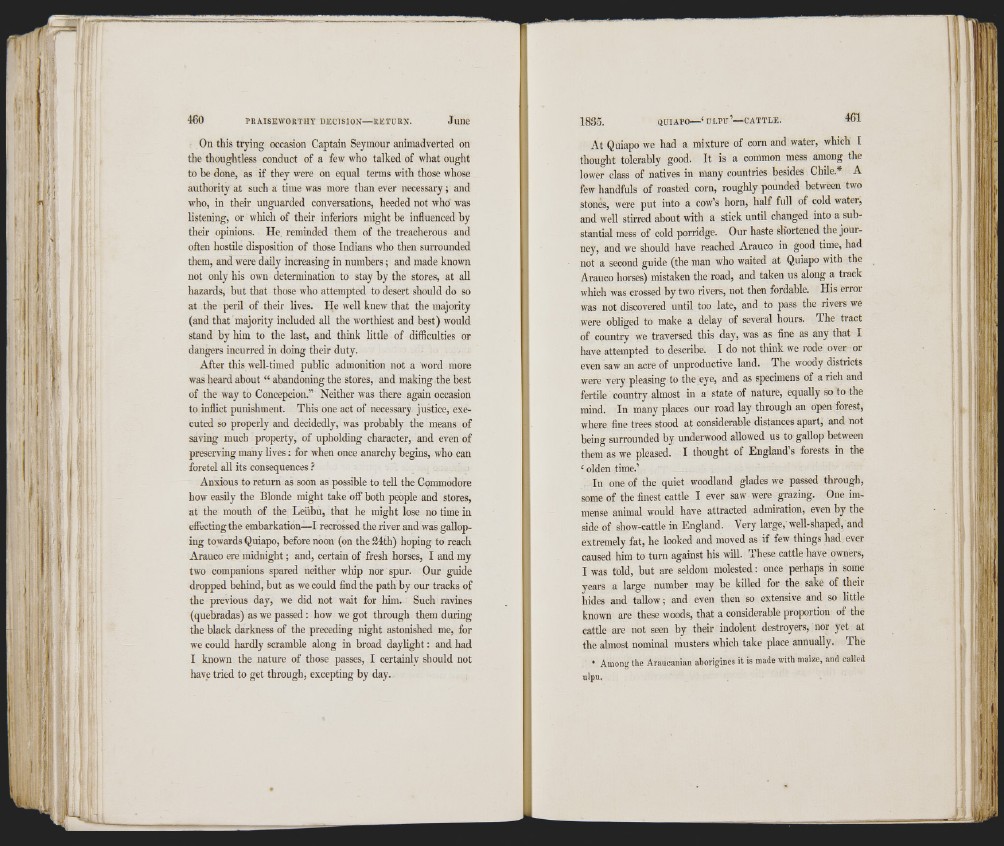
li!j>
l _
|i M H i i i
i " . ■ )!’
% ? M i
i 1 -
5 7 ,
’ t " ’ r
I " " II
460 June
On this trying occasion Captain Seymour animadverted on
the thoughtless conduct of a few who talked of what ought
to be done, as if they were on equal terms with those whose
authority at such a time was more than ever necessary; and
who, in their unguarded conversations, heeded not who was
listening, or which of their inferiors might be influenced by
their opinions. He, reminded them of the treacherous and
often hostile disposition of those Indians who then surrounded
them, and were daily increasing in numbers; and made known
not only his own determination to stay by the stores, at all
hazards, but that those who attempted to desert should do so
at the peril of their lives. He 'veil knew that the majority
(and that majority included all the worthiest and best) would
stand by him to the last, and think little of difficulties or
dangers incurred in doing their duty.
After tliis well-timed public admonition not a word more
was heard about “ abandoning the stores, and making the best
of the way to Concepcion.” Neither was there again occasion
to inflict punishment. This one act of necessary justice, executed
so properly and decidedly, was probably the means of
saving much property, of upholding character, and even of
preserving many lives; for when once anarchy begins, who can
foretel all its consequences ?
Anxious to return as soon as possible to teU the Commodore
how easily the Blonde might take off both people and stores,
at the mouth of the Leiibu, that he might lose no time in
effecting the embarkation—I recrossed the river and was galloping
towards Quiapo, before noon (on the 24th) hoping to reach
Arauco ere midnight; and, certain of fresh horses, I and my
two companions spared neither wliip nor spur. Our guide
dropped behind, but as we could find the path by our tracks of
the previous day, we did not wait for him. Such ravines
(quebradas) as we passed : how we got through them during
the black darkness of the preceding night astonished me, for
we could hardly scramble along in broad daylight: and had
I known the nature of those passes, I certainly should not
have tried to get through, excepting by day.
P M
; T
At Quiapo we had a mixture of com and water, which I
thought tolerably good. It is a common mess among the
lower class of natives in many countries besides Chile.* A
few handfuls of roasted corn, roughly pounded between two
stones, were put into a cow’s horn, half full of cold water,
and well stirred about with a stick until changed into a substantial
mess of cold porridge. Our haste shortened the journey,
and we should have reached Arauco in good time, had
not a second guide (the man who waited at Quiapo with the
Arauco horses) mistaken the road, and taken us along a track
which was crossed by two rivers, not then fordable. His error
was not discovered until too late, and to pass the rivers we
were obliged to make a delay of several hours. The tract
of country we traversed this day, 'vas as fine as any that I
have attempted to describe. I do not think we rode over or
even saw an acre of unproductive land. The woody districts
were very pleasing to tbe eye, and as specimens of a rich and
fertile country almost in a state of nature, equally so to the
mind. In many places our road lay through an open forest,
where fine trees stood at considerable distances apart, and not
being surrounded by underwood allowed us to gallop between
them as we pleased. I thought of Lngland’s forests in the
‘ olden time.’
In one of the quiet woodland glades we passed through,
some of the finest cattle I ever saw were grazing. One immense
animal would have attracted admiration, even by the
side of show-cattle in England. Very large, well-shaped, and
extremely fat, he looked and moved as if few things had ever
caused him to turn against his will. These cattle have owners,
I was told, but are seldom molested: once perhaps in some
years a large number may be killed for the sake of their
hides and tallow; and even then so extensive and so little
known are these woods, that a considerable proportion of the
cattle are not seen by their indolent destroyers, nor yet at
the almost nominal musters which take place annually. T he
• Among the Araucanian aborigines it is made with maize, and called
ulpu.
(i'l
i l l l il
I ' l - ’